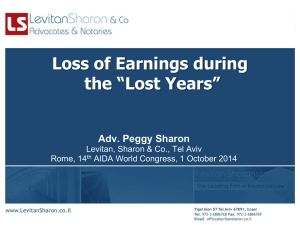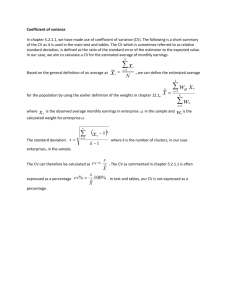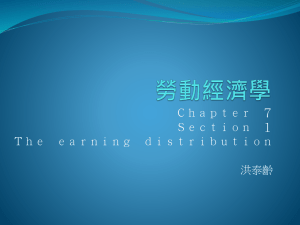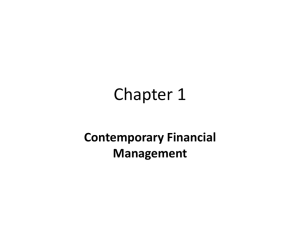1. ROYALTY and Income WAIVERS
advertisement
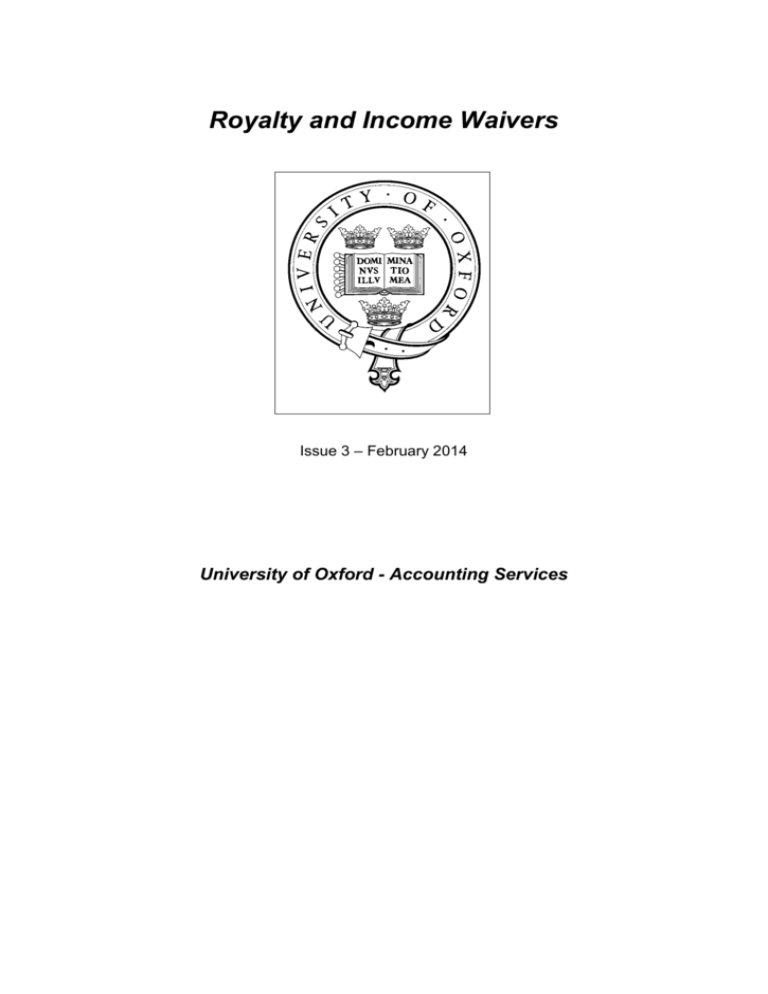
Royalty and Income Waivers Issue 3 – February 2014 University of Oxford - Accounting Services Issue 3 – February 2014 Royalty and Income Waivers DOCUMENT VERSION This document is Issue 3.0, issued in February 2014. You should ensure that you are using the latest current version – if in doubt check with the Accounting Services section of the Finance Department (contact details below). If you have previous versions of this document then please disregard and destroy them. CONTACT DETAILS This document is produced and controlled by the tax manager on behalf of the Head of the Accounting Services section. If you have any feedback or queries on the detail then please contact one of the following: Contact Telephone E-Mail John Huke (Tax Manager) (6)16030 John.huke@admin.ox.ac.uk Martina Zagaria (Royalties Officer) (6)16142 martina.zagaria@admin.ox.ac.uk (Please note these details are correct at time of publication but may be subject to change.) University of Oxford – Accounting Services 1 Issue 3 – February 2014 Royalty and Income Waivers CONTENTS 1. ROYALTY AND INCOME WAIVERS ................................................................................ 3 1.1 1.2 1.3 1.4 1.5 PURPOSE OF DOCUMENT AND APPLICABILITY: ............................................................... 3 SUMMARY OF WAIVING RULES AND PROCESS: ............................................................... 3 REGULATIONS – UNIVERSITY REGULATIONS GOVERNING ROYALTY INCOME: ................. 5 REGULATIONS – TAX LEGISLATION: ............................................................................... 5 FURTHER GUIDANCE ON INTERPRETATION OF REGULATIONS: ........................................ 6 APPENDIX ‘A’ – FORM OF WAIVER ....................................................................................... 7 APPENDIX ‘B’ – PRIMARY LEGISLATION ............................................................................. 1 B.1 B.2 ITEPA 2003 EXTRACTS: .............................................................................................. 1 HMRC GUIDANCE EXTRACTS:...................................................................................... 2 University of Oxford – Accounting Services 2 Issue 3 – February 2014 Royalty and Income Waivers 1. ROYALTY AND INCOME WAIVERS 1.1 Purpose of document and applicability: 1.1.1 This document is produced to provide guidance on the waiving of royalty income and other income in the nature of employment and to consolidate previous guidance documentation into a single place. 1.1.2 It is applicable if an inventor wishes to waive his or her right to royalty income in favour of his or her department, or if a member of University staff wishes to give up their right to receive all or part of their employment income in favour of the University. 1.1.3 A summary of key points is given in the following section and this is supported by further detail in the sections thereafter on the guidance and governing legislation which applies. 1.1.4 It is important – for correct treatment of income tax and national insurance – that the defined procedures are followed. Failure to do so may result in complications involving HMRC (Her Majesty’s Revenue and Customs, the UK Tax Authority), for both the University and individuals concerned. 1.2 Summary of waiving rules and process: 1.2.1 As a general rule, payment of earnings due to an employee is subject to income tax and NICs (National Insurance Contributions). Earnings may be in cash or non-cash form (for which an equivalent value is computed) and need not actually have been paid over to become assessable for tax purposes, the key being the date on which payment is due rather than made. 1.2.2 Revenue generated through the exploitation of intellectual property, through the Research Services Office, Isis, or any other source, when due to an individual is treated for tax purposes as employment-related income. 1.2.3 Should an employee of the University, or an individual in receipt of royalty payments, wish to waive his or her rights to income due, the following key points apply: (i) The waiver must be made on the correct form of waiver – a copy of which is attached at Appendix ‘A’. This document has been drafted to reflect the wording of University Regulations, the terms of the University’s contract of employment and governing taxation legislation. (ii) In the case of royalty income the waiver must be made in respect of all revenues associated with the specified intellectual property – it cannot be limited to a particular licence or part of the intellectual property. (iii) In the case of other employment income the waiver must be made in respect of particular allowances which can be separately identified from basic pay, or it must be made in respect of all pay. (iv) A waiver is only effective against future income entitlements. For royalties this means in advance of the income being received by the University; for allowances or pay it means in advance of the period to which the pay relates (e.g. in advance of the month when the pay becomes due). If a waiver is signed after the income becomes due – even if it has not actually been paid over – then the individual will still be assessed for tax even though the income concerned is not received. University of Oxford – Accounting Services 3 Issue 3 – February 2014 Royalty and Income Waivers (v) The waiver must be absolute – it is not possible for the individual making the waiver to prescribe a time limit or to insist that the sums waived are directed in a particular fashion. The University will take account of the individual’s wishes, however, to waive in favour of a specified department or unit. This is also to comply with tax regulations. (vi) In accordance with points (iv) and (v) above, annual or renewable waivers are invalid. (vii) An income waiver means that the right to receive that income from the University is given up and the University (or a department of the University) will retain future income. This right is not transferable and cannot be used as a means of transferring income to other individuals or organizations. (viii) Completed waiver forms for royalty income should be forwarded to the Royalties Officer, Tax Team, Finance Division, 23-38 Hythe Bridge Street, Oxford, OX1 2ET. (ix) Completed waiver forms for other employment income should be forwarded to the Head of Accounting Services, Finance Division, 23-38 Hythe Bridge Street, Oxford, OX1 2ET. (x) In the case of royalties, contributors to the intellectual property should be identified through the IP forms (1 and 2) as usual and each inventor has the individual right to waive or not to waive his or her rights to revenue. (xi) In the case of royalties the proportion of income identified to the University’s General Revenue Account will not usually be waived in favour of the inventor’s department, except in exceptional circumstances where a case can be made to and agreed by the Head of Research Services and Director of Finance, or their nominated representatives. (xii) A waiver is an irrevocable action that remains in place for the lifetime of the income stream to which it relates. There are other ways to donate to the University that may offer more flexibility. Please contact us for more details. University of Oxford – Accounting Services 4 Issue 3 – February 2014 Royalty and Income Waivers 1.3 Regulations – University Regulations governing royalty income: 1.3.1 Administration of policy on intellectual property is governed under University Regulations, specifically Council Regulations 7 of 2002 (as amended March 2003 and June 2004). A copy of these regulations can be viewed on the University’s intranet at the following location: http://www.admin.ox.ac.uk/statutes/regulations/182-052.shtml 1.3.2 These regulations include the framework by which net royalty revenue received by the University shall be distributed. At present this is as per the following table (from paragraph 7.(4)): Total net revenue Researcher(s) General Departments Revenue Account Up to £50K Band from £50K and 86.2%* 13.8%* 0% 45% 30% 25% 22.5% 40% 37.5% up to £500K Over £500K Paragraph 7.(4) also explains the asterisk in column one: “The percentage asterisked above is intended to put the University in funds to pay the employer's National Insurance Contribution(s), but otherwise to leave the General Revenue Account out of the allocation of the band in question: both asterisked percentages shall be adjusted to match this intention, as and when the rates of National Insurance Contribution vary.” 1.3.3 Statute XVI – available on the University’s intranet at the following location: http://www.admin.ox.ac.uk/statutes/790-121.shtml - defines University property and specifically, under Part B, intellectual property, outlining what is included and excluded from University ownership. Part B, paragraphs 6 and 7 define, respectively, those items which the University claims intellectual property rights to and those to which it does not. 1.4 Regulations – tax legislation: 1.4.1 The primary tax legislation which applies to the waiving of royalty and employment income is the Income Tax (Earnings and Pensions) Act of 2003, referred to as ‘ITEPA 2003’. The relevant sections of this Act are provided in Appendix ‘B’ together with the interpretative guidance also used by Her Majesty’s Revenue and Customs (HMRC), the body which combines the former Inland Revenue and Customs and Excise. 1.4.2 Details of ITEPA 2003 can be found at: http://www.opsi.gov.uk/acts/acts2003.htm University of Oxford – Accounting Services 5 Issue 3 – February 2014 Royalty and Income Waivers 1.4.3 Details of the HMRC guidance can be found at: http://www.hmrc.gov.uk/manuals/eimanual/EIM42705.htm - and links from this page. 1.5 Further guidance on interpretation of regulations: 1.5.1 The University’s tax advisors, KPMG, have also provided the following guidance on further interpretation of the regulations: (i) Absolute nature of waivers: The individual making the waiver essentially gives up all rights to receive anything and relies upon the goodwill of the employer to restore that right at some point in the future. If this was not the case then it would not be a successful waiver. (ii) Restoring a right to income: If, subsequent to an effective waiver being put in place, the individual or estate indicates that they would like to receive the royalty, then the employer can – at its discretion – decide to restore the right to them. As long as a reasonable period of time has elapsed, usually at least 12 months, there should be no problem. University of Oxford – Accounting Services 6 Issue 3 – February 2014 Royalty and Income Waivers APPENDIX ‘A’ – FORM OF WAIVER The current form of waiver for use with both royalty streams and other employment income is provided on the following page. Parts (i) and (ii) should be completed by all applicants, parts (iii) and (iv) by applicants wishing to waive royalty income only. Applicants seeking to waive income which is not royalty-related should strike out parts (iii) and (iv). Applicants who wish to express a preference should complete part (v) and specify the department, fund or project to which they would like to see the income directed. Please refer to paragraph 1.2.3 (v) in the main text of the document, however, concerning individual rights to express this preference. The declaration must be completed by all applicants and signed and dated in the presence of a witness. The original should be sent to the Royalties Officer for royalties and to the Payroll Manager for other income waivers. University of Oxford – Accounting Services 7 DEED OF WAIVER To: The Director of Finance University of Oxford University Offices Wellington Square OXFORD OX1 2JD Waiver of Remuneration or Royalty Entitlement By this Deed, I waive absolutely and irrevocably my entitlement to all and any remuneration or royalties received by the University of Oxford at any time in respect of the salary, fees, allowances, bonuses or intellectual property described below:(i) Description of remuneration or Intellectual Property: …………………………………………………………………………………………… …………………………………………………………………………………………… …………………………………………………………………………………………… (ii) Date remuneration becomes due: ……………………………………………………… (iii) Patent Application No. (if any) / Research Services data (if applicable): …………………………………………………………………………………………… …………………………………………………………………………………………… (iv) Isis Project No. and Title (if applicable): …………………………………………………………………………………………… (v) I know that, having waived, I have no rights; but it is my wish that the funds released be credited to: …………………………….……………..……Department; Code ……………….………….. Signed and delivered as a Deed by (Signature of individual) ……………………………………… (Full name of individual signing) …………………………….……………..……………… ……………………………………… in the presence of (Signature of witness) (Full name of witness) …………………………….……………..……………… Dated: JZS / APR-2006 ……………………………………… Issue 3 – February 2014 Royalty and Income Waivers APPENDIX ‘B’ – PRIMARY LEGISLATION B.1 ITEPA 2003 Extracts: The following extracts are from the sections of the Income Tax (Earnings and Pensions) Act 2003: 15 Earnings for year when employee resident, ordinarily resident and domiciled in UK (1) This section applies to general earnings for a tax year in which the employee is resident, ordinarily resident and domiciled in the United Kingdom. (2) The full amount of any general earnings within subsection (1) which are received in a tax year is an amount of "taxable earnings" from the employment in that year. (3) Subsection (2) applies(a) whether the earnings are for that year or for some other tax year, and (b) whether or not the employment is held at the time when the earnings are received 18 Receipt of money earnings (1) General earnings consisting of money are to be treated for the purposes of this Chapter as received at the earliest of the following timesRule 1 The time when payment is made of or on account of the earnings. Rule 2 The time when a person becomes entitled to payment of or on account of the earnings. 686 Meaning of "payment" (1) For the purposes of PAYE regulations, a payment of, or on account of, PAYE income of a person is treated as made at the earliest of the following timesRule 1 The time when the payment is made. Rule 2 The time when the person becomes entitled to the payment. University of Oxford – Accounting Services 1 Issue 3 – February 2014 Royalty and Income Waivers B.2 HMRC Guidance Extracts: Waivers of remuneration – overview B.2.1 HMRC guidance note EIM42705 – available at http://www.hmrc.gov.uk/manuals/eimanual/EIM42705.htm - provides the following overview: Sections 15(2) and 18 ITEPA 2003 A waiver of remuneration happens when an employee gives up rights to remuneration and gets nothing in return. Where the employee gets a non-cash benefit in return, this is called a salary sacrifice. For guidance on a salary sacrifice see EIM42750 onwards. The effect of a waiver for income tax purposes depends on its timing. If the remuneration waived is given up before it is treated as received for employment income purposes then the remuneration given up will not be taxable earnings. If the remuneration waived is given up after it is treated as received for employment income purposes then the employee remains taxable on the remuneration given up. B.2.2 HMRC guidance note EIM42710 – available at http://www.hmrc.gov.uk/manuals/eimanual/EIM42710.htm - provides further detail as follows: Sections 15(2) and 18 ITEPA 2003 and Section 43 FA 1989 A waiver can be of fees and bonuses as well as salary. The crucial factor for tax purposes is whether the remuneration waived is given up before it is treated as received for employment income purposes. Once a director or employee is treated as having received money earnings (see EIM42260 onwards): PAYE is deductible they are taxable earnings of the employee and the employer is entitled to a deduction for them in computing the profits of its business. A subsequent waiver of remuneration will neither reduce the amount of remuneration subject to PAYE nor the amount of taxable earnings. For more detail on this point see EIM42715. University of Oxford – Accounting Services 2 Issue 3 – February 2014 Royalty and Income Waivers Receipt of income for tax purposes B.2.3 HMRC guidance note EIM422260 – available at http://www.hmrc.gov.uk/manuals/eimanual/EIM42260.htm - explains the meaning of when income is deemed to be received for tax purposes: Sections 18 ITEPA 2003 With the exception of some foreign earnings, money earnings are chargeable to tax in the year they are received. Money earnings are treated as received for assessment purposes, and paid for PAYE purposes, on the earliest of the following: when a payment of earnings is actually made or when a payment on account of earnings is made (see EIM42270) the time when a person becomes entitled to payment of earnings or a payment on account of earnings (see EIM42290) … Note that where more than one time can be taken as the time of receipt you take the earliest time. For example, an employee may be entitled to a payment of earnings on 31 March 2005 but actual payment may not be made until 12 April 2005. Receipt is deemed to take place on 31 March 2005 (applying the entitlement rule) and the earnings are therefore assessable in, and PAYE must be operated in, 2004/05. B.2.4 HMRC guidance note EIM422270 – available at http://www.hmrc.gov.uk/manuals/eimanual/EIM42270.htm - expands on the first condition outlined above: Rule 1, Sections 18(1) and 686(1) ITEPA 2003 Earnings are treated as received when they are actually paid or when a payment on account of earnings is made. For payments on account, see EIM42280. Actual payment happens when the income comes into the control of the employee so that they are able to deal with it for their own use and benefit. All the following count as actual payment for the purposes of assessment as employment income, and for the operation of PAYE: handing over cash or a cheque. In law, payment by cheque is made when the employer posts it or hands it over to the employee. The date the cheque is cashed or put into the bank does not matter. a credit transfer to a bank or building society account crediting an account in the employer's books on which the employee is free to draw at will (Garforth v Newsmith Stainless Ltd (52TC522)). paying the income to a third party or using it in some way at the employee's discretion or with his consent to a purpose of his choosing. This does not mean that PAYE is due on all "pecuniary liability" payments. PAYE will only be due if what is paid out is income that is due to the employee, but that the employee directs to be applied in a way of his or her choice. University of Oxford – Accounting Services 3 Issue 3 – February 2014 Royalty and Income Waivers B.2.5 HMRC guidance note EIM422290 – available at http://www.hmrc.gov.uk/manuals/eimanual/EIM42290.htm - expands on the second condition outlined above: Rule 2, Sections 18(1) and 686(1) ITEPA 2003 Earnings are treated as received when a person becomes entitled to payment of or on account of earnings. For employees, the terms of service agreed by the employer and employee will tell you when an employee is entitled to be paid earnings. Note that the rule is when a person becomes entitled to payment of earnings. This is not necessarily the same as the date on which an employee acquires a right to be paid. For example, an employee's terms of service may provide for the employee to receive a bonus for the year to 31 December 2004, payable on 30 June 2005 if the employee is still in the service of the employer on 31 December 2004. If the condition is satisfied the employee becomes entitled to a payment on 31 December 2004 but is only entitled to payment of it on 30 June 2005. So PAYE applies to it on 30 June 2005 and it is assessable for 2005/06. The date that matters is the date the employee is entitled to be paid the bonus. It can happen that payment is actually made after the date the employee is entitled to be paid. For example, to help out a hard-pressed employer employees may agree not to draw their pay. In that situation they are deemed to have been paid on the day they were entitled to be paid. The Equal Pay Act (1970) and the National Minimum Wage Act (1998) give entitlement to employees in similar ways. Both Acts insert a clause into the employment agreement, if it does not already exist, giving the worker the right to equal pay and/or the appropriate national minimum wage rate. Entitlement to equal or higher pay arises from the time when lower or discriminatory wages were paid. If a sum is paid to an employee in respect of arrears of pay Rule 2 of s18 and s31 ITEPA gives the earliest time; entitlement arose before the arrears were paid. The lump sum is not assessable in the year in which it is paid. It must be broken down into sums attributable to the years that the arrears are for. Rule 2 of s686(1) ITEPA gives the same result for PAYE purposes. The employer should have operated PAYE when the employee was entitled to receive the payments. When paying the lump sum, the employer may in fact deduct PAYE at the rates that should have been operated for the years to which the arrears are attributable. The employee is always assessable upon the gross arrears for each year, and is entitled to a credit for the PAYE tax referable to each year. University of Oxford – Accounting Services 4
